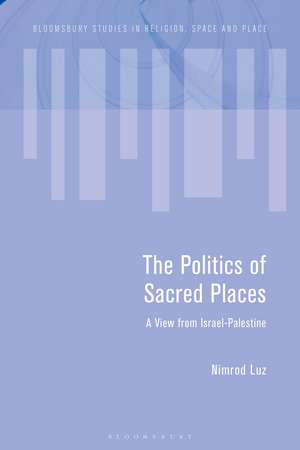The Politics of Sacred Places: A View from Israel-Palestine: Bloomsbury Studies in Religion, Space and Place
Autor Nimrod Luzen Limba Engleză Hardback – 4 oct 2023
Preț: 510.60 lei
Preț vechi: 731.29 lei
-30% Nou
Puncte Express: 766
Preț estimativ în valută:
97.71€ • 101.35$ • 81.47£
97.71€ • 101.35$ • 81.47£
Carte tipărită la comandă
Livrare economică 27 martie-10 aprilie
Preluare comenzi: 021 569.72.76
Specificații
ISBN-13: 9781350295728
ISBN-10: 1350295728
Pagini: 240
Ilustrații: 10 bw illus
Dimensiuni: 156 x 234 mm
Greutate: 0.51 kg
Editura: Bloomsbury Publishing
Colecția Bloomsbury Academic
Seria Bloomsbury Studies in Religion, Space and Place
Locul publicării:London, United Kingdom
ISBN-10: 1350295728
Pagini: 240
Ilustrații: 10 bw illus
Dimensiuni: 156 x 234 mm
Greutate: 0.51 kg
Editura: Bloomsbury Publishing
Colecția Bloomsbury Academic
Seria Bloomsbury Studies in Religion, Space and Place
Locul publicării:London, United Kingdom
Caracteristici
Engages with cutting edge theories in cultural and political geography, giving this book a rich and unique approach to sacred places and a range of socio-spatial processes
Notă biografică
Nimrod Luz is Head of the Research Authority at Kinneret College on the Sea of Galilee, Israel.
Cuprins
Introduction1. Contextualizing Sacred Places in Israel/Palestine: Ethnocracy, Colonization and Decolonization.2. Embodying the Sacred and the Body in Sacred Places. 3. Sacred Sites in Rural Communities.4. Sacred Sites and the Right to the City.5. Decolonizing the City: Claiming Sacred Places in a Mixed Israeli City.6. Glocalizing the Sacred: Moving to the National and Beyond.Conclusions.BibliographyIndex
Recenzii
This book is theoretically grounded, empirically original, and spans multiple domains of interest. It engages with ideas, and will be of interest to scholars, from across the humanities and social sciences. Each chapter does an excellent job of first introducing key theoretical debates, and how they have evolved over the years, before weaving in the author's own theoretical interventions and empirical material.
This is an impressive traverse across theoretical literatures about sacred space, drawing from multi-disciplinary literatures. Nimrod Luz's many years of deep and careful empirical research demonstrates how the sacred intersects deeply and in complex ways with myriad dimensions of political, social and economic life. While applying existing theoretical positions to his specific study contexts, he also interrogates and challenges received wisdom as a consequence, taking account of historical and geographical specificities.
Blending geography with ethnography, history with contemporary politics, Luz provides an illuminating and engaging portrait of contested holy spaces in Israel-Palestine; but he also presents us with a challenging larger vision as he reflects on scale, spatiality and the sacred in assessing possibilities for constructing alternative imaginings of the socio-political away from the scrutiny of the state.
A stimulating, multidisciplinary exploration of space, place and scale which draws on both key theoretical perspectives and deep ethnographic knowledge to show how sacred places can provide arenas where minorities are able to develop alternative visions of society and politics.
In this excellent book Nimrod Luz sheds new light on religion as a major part of ethnocratic politics. Using a range of critical theoretical angles, Luz takes us on a fascinating tour of sacred Israel/Palestine and exposes the omnipotent nexus between power, identity, sacredness and space. This is a major contribution to understanding religion as a key player in shaping space and society in the 21st century.
This is an impressive traverse across theoretical literatures about sacred space, drawing from multi-disciplinary literatures. Nimrod Luz's many years of deep and careful empirical research demonstrates how the sacred intersects deeply and in complex ways with myriad dimensions of political, social and economic life. While applying existing theoretical positions to his specific study contexts, he also interrogates and challenges received wisdom as a consequence, taking account of historical and geographical specificities.
Blending geography with ethnography, history with contemporary politics, Luz provides an illuminating and engaging portrait of contested holy spaces in Israel-Palestine; but he also presents us with a challenging larger vision as he reflects on scale, spatiality and the sacred in assessing possibilities for constructing alternative imaginings of the socio-political away from the scrutiny of the state.
A stimulating, multidisciplinary exploration of space, place and scale which draws on both key theoretical perspectives and deep ethnographic knowledge to show how sacred places can provide arenas where minorities are able to develop alternative visions of society and politics.
In this excellent book Nimrod Luz sheds new light on religion as a major part of ethnocratic politics. Using a range of critical theoretical angles, Luz takes us on a fascinating tour of sacred Israel/Palestine and exposes the omnipotent nexus between power, identity, sacredness and space. This is a major contribution to understanding religion as a key player in shaping space and society in the 21st century.













